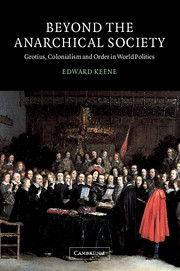Book contents
- Frontmatter
- Contents
- Preface
- Acknowledgements
- Introduction
- 1 The orthodox theory of order in world politics
- 2 The Grotian theory of the law of nations
- 3 Colonialism, imperialism and extra-European international politics
- 4 Two patterns of order in modern world politics: toleration and civilization
- 5 Order in contemporary world politics, global but divided
- Conclusion
- Bibliography
- Index
1 - The orthodox theory of order in world politics
Published online by Cambridge University Press: 22 September 2009
- Frontmatter
- Contents
- Preface
- Acknowledgements
- Introduction
- 1 The orthodox theory of order in world politics
- 2 The Grotian theory of the law of nations
- 3 Colonialism, imperialism and extra-European international politics
- 4 Two patterns of order in modern world politics: toleration and civilization
- 5 Order in contemporary world politics, global but divided
- Conclusion
- Bibliography
- Index
Summary
Nowadays, order in modern world politics is usually described in terms of the norms, rules and institutions of the European society of states. The distinguishing characteristic of this international society is that it acknowledges the existence of different political systems and cultures in the world, and attempts to facilitate their peaceful coexistence with one another by promoting toleration. It tries to achieve this goal through the normative principle of the reciprocal recognition of sovereignty: each state is supposed to recognize the independent sovereignty of the others within their territorially defined spheres of domestic jurisdiction. Thus no state is allowed to interfere in the internal affairs of another, and each has the space to develop its own way of life as it chooses. Numerous implications for the structure of international order follow from this starting point. Because each state is an independent sovereign, there is by definition no central authority that can lay down and enforce international law, maintain peace and security, or compel the members of international society to act in ways that are contrary to their national interests. The institutions of the society of states therefore have to be able to cope with extreme decentralization, even anarchy. For example, the integrity of the system and the independence of its individual members are primarily maintained by the highly flexible and voluntaristic institution of the balance of power, albeit sometimes with the addition of a special managing role for the great powers.
- Type
- Chapter
- Information
- Beyond the Anarchical SocietyGrotius, Colonialism and Order in World Politics, pp. 12 - 39Publisher: Cambridge University PressPrint publication year: 2002

